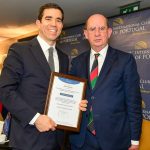Government to end 2024 with a “40% execution rate” on Recover Portugal funds for projects of national interest says minister
A minister in the Portuguese government is to ask the European Commission to extend its deadline by six months to 30 June, 2026 for consortiums to complete major public works and other technologically-orientated projects aimed at modernising the Portuguese economy.
Manuel Castro Almeida, Minister of State and for the Territorial Cohesion of Portugal, speaking at a lunch organised by the International Club of Portugal on Friday, 6 December in Lisbon on ‘European Funds – should they be spent or invested?’, on the issue of unblocking European Union investment through Portugal’s Recovery and Resilience Plan (RRP) for public and private projects, said that Portugal would ask Brussels to extend the deadlines for ‘mobilising agendas’ that needed to be completed by the start of 2026, extending the deadline to the end of June, 2026.
Up until May this year, Portugal had very low execution rates when it came to allocating EU funds to projects, with the country only having spent 0.5% of the €23Bn in EU development funds between 2021 and 2027, as planned in the state’s “Portugal 2030” plan, while it had only spent 20% of the RRP funds to May, despite being halfway through the implementation period agreed with Brussels, which is due to terminate at the end of 2026.
The Portuguese RRP is a programme to apply EU funds nationally on key sectors in need of modernisation and projects of national importance that were agreed by Brussels to modernise and rebuild the shattered economies of the EU Member States ravaged as a consequence of the series of ´lockdowns’ resulting in the effective shutdown of Europe’s economies as a result of the Covid-19 pandemic in 2020.
Projects and allocations running behind schedule
In the case of Portugal, the projects and the funds to pursue them are part of a set of reforms and investments that will allow the country to “resume sustained economic growth”. It will be financed by total resources of €16.6Bn, distributed through €14Bn of grants and €2.7Bn in loans.
These funds, which have been allocated through a series of ‘mobilising agendas’ aimed at funding projects of national and economic interest for revitalising Portugal’s economy were channelled to consortiums – some of which involve up to 100 companies – to fulfil the ‘mobilising agenda’ projects with an implementation period until the end of 2025.
At the ICPT lunch held at the Sheraton Lisboa & Spa hotel in Lisbon, the minister explained his decision by saying that there were still ‘mobilising agendas’ “running well and according to plan and others not so”, with many consortiums “”behind schedule.”
Instead he will put it to Brussels that the execution date limit should be extended by six months to the end of June, 2026.
“We have decided now to suggest to the European Commission regarding the re-scheduling of the RRP, that the deadline for the mobilising agendas should be extended to the end of June, 2026 because the overwhelming majority had a deadline set up until December, 2025 and some before this deadline”, said Manuel Castro Almeida.
And he said that if it became clear that it would be impossible for some projects to meet the extended deadline, these would be removed from the list and replaced by others. The new list of projects would be submitted to Brussels in January.
On track for a 40% execution rate
According to the Cohesion Minister, currently “the idea that there are delays in the deployment of European funds is starting to fade” and he stressed that the Government expected to end the year with an execution rate of around 40%.
2025 “will be the ‘cruising phase’ year for the RRP”, he said using a somewhat odd jet liner analogy, with “many works underway on the ground”, recalling that when Portugal asked for for the sixth funding cheque from Brussels, Portugal was “the second country to do so”, only surpassed by Italy, and did so “45 days before the deadline”. 2026 will be more demanding, since “there are more milestones and goals to meet”, admitted Manuel Castro Almeida.
Manuel Castro Almeida also emphasised that to achieve this “cruising phase” it had been “necessary to change a number of things” hence the need to extend the deadline by six months on the RRP and PT2020. (The projects in the latter almost subscribed)
The minister also said that one of the biggest problems fulfilling the deadlines agreed with the EU was that many of the projects were large-scale public works and Portugal had been finding it difficult to secure qualified labour.
And in order to get these construction projects done, the government would have to open the door to attracting overseas workers by offering them a work visa, contract and guaranteed housing.
What is Portugal PT2020/2030?
PT2020 and PT2030 are part of a European Union strategy, agreed by all member states, launched in 2010 and 2020 respectively for the following ten years; in other words 10-year development plans. PT2030, for example, was subsequently not only aimed at overall ongoing growth, levelling up with more developed EU Member States, and employment, but was re-adapted with a view to help EU Member States to recover from the Covid-19 crisis, but also at filling deficiencies in Portugal’s growth model and creating conditions for growth benefitting a number of public and private sector areas.
“The RRP and PT2020/PT2030 were being carried out by virtually the same people and you can’t have that”, explained the minister who said it created serious inefficiencies.
Moreover, “four or five months ago candidate projects were being analysed with the help of artificial intelligence, although the process was still at a pilot stage but already showed visible results.
Extra mobile experts brought in
Manuel Castro Almeida also mentioned special public contract measures approved by the government that included a prior licence waiver from Portugal’s Court of Auditors – an independent government and public spending watchdog – for RRP projects.
On the other hand, some 50 “mobile technicians” had been contracted for ‘Recover Portugal’ (the brand name given to Portugal’s Recovery and Resilience Plan) who will help bridge gaps in work and “hop from service to service” as needed. “I actually think this is an innovation in the public administration”, he said.
Moreover, the minister shared that a short time ago the Prime Minister had asked him to set up a small working group in the government that would meet regularly with a group of secretaries of State whose mission would be to check on difficulties regarding private investments.
When the government took office earlier this year, Portugal made it clear to the EU that it intended to speed up the rate at which it spends money from the Recovery and Resilience Plan (RRP) after the Prime Minister, Luís Montenegro had been concerned that the spending rate had been very low and wanted to increase transparency in accessing funds.
In April 2024 he said: “We must strongly accelerate this exceptional opportunity to improve the lives of the Portuguese,” at a debate on the programme of his right-of-centre coalition Democratic Alliance (AD) government.
“In the third and fourth RRP payment requests submitted to Brussels, the European authorities withheld €713 million because the contracted targets were not met”, he added.
The Prime Minister also announced at that time that a request to release this amount would be submitted “within the next 60 days” and that the fifth payment request, which “should have been submitted but was not”, would be submitted “within the next 90 days, which it duly was. Brussels finally released this tranche of €3Bn this month after blocking it for two and a half years. (December, 2024)
Manuel Castro Almeida, a Portuguese lawyer and politician who has been in government since Prime Minister Luís Montenegro won the elections in March 2024, was in many ways selected as the ‘man for the job’ overseeing the application of EU funds and project implementation having served under a previous centre-right PSD government headed by ex-Prime Minister Pedro Passos Coelho who appointed him as the Secretary of State for Regional Development. (2013-2015)
Previously, he was a member of the Assembly of the Republic for the Social Democratic Party, Secretary of State for Education and Sports and Mayor of São João da Madeira – a town near Porto.
With the arrival of Rui Rio as president of the Social Democratic Party, in 2018, Castro Almeida was chosen to be one of the party’s vice-presidents. He resigned in July 2019.
He is on record for saying he is against the Chief of Staff of the Portuguese Armed Forces, Henrique Eduardo Passaláqua de Gouveia e Melo standing in the elections next year for the Portuguese Presidency saying that having a military figure as head of State would be an “abnormality”, instead suggesting the PSD candidate and TV political commentator, Luís Marques Mendes would be a better choice as a possible President of the Republic.










